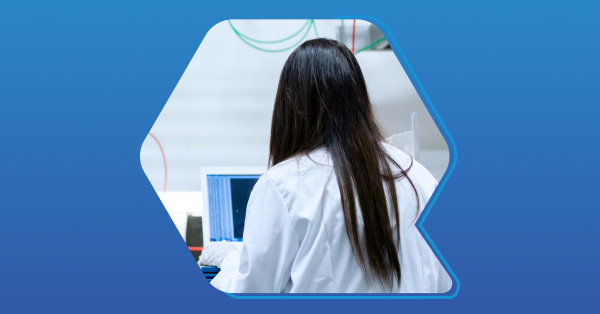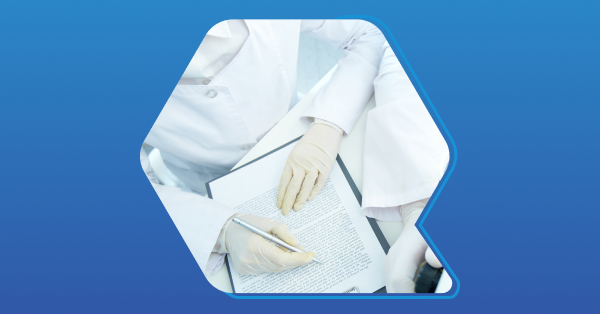How a LIMS Helps Labs Ensure Data Security and Integrity

The threats of data breaches and cyber-attacks make scaling a modern lab a thorny challenge.
Especially for labs still relying on outdated tech to manage their data (like spreadsheets or pen and paper). Fortunately, your lab has an answer to these challenges: a Laboratory Information Management System (LIMS).
In this article, we’ll demonstrate why data integrity and security are critical to labs and how a LIMS can help.
What Do We Mean By “Sensitive Data?”
While labs should maintain the security of all their data, it’s essential to maintain the integrity of sensitive data. By “sensitive data” we mean information that has the potential to jeopardize the privacy or security of a person/client your lab is serving. This includes:
- Protected Health Information: Also called PHI, this covers individually identifiable health information.
- Personally Identifiable Information: Also called PII, this includes any data that can be utilized to identify an individual, such as their name or address.
- Commercial information: This includes business-related data such as contracts and agreements with suppliers, partners, and customers.
- Clinical trial and study data: This refers to information collected during research studies involving human subjects to test the safety, efficacy, and effectiveness of new drugs, treatments, or medical devices.
Protecting sensitive data is critical if your lab aims to meet HIPAA compliance or certain GxP standards.
Why Data Security and Integrity Matters for Labs
Keeping sensitive data secure is a core competency of an organized and compliant lab.
Ensuring the integrity of your lab’s data can help with:
- Protecting client and patient privacy: If your lab handles patient data, proprietary research, and confidential formulas then breaching this data can lead to significant legal and financial repercussions.
- Help your lab meet compliance standards: Many labs are subject to strict regulatory requirements that dictate how data must be managed, protected, and reported. For instance, labs working in the healthcare sector may need to comply with HIPAA, or GDPR (General Data Protection Regulation) in the EU, which have specific stipulations for data security and privacy.
- Make better decisions: Labs generate vast amounts of data critical for research, diagnosis, and product development. The integrity of this data is key, as it forms the basis for critical decisions that could affect patient outcomes, research validity, and the success of products.
- Ensure trust and confidence: Incidents of data breach or misuse can erode trust and have wider implications for public health and safety.
Maintaining the security and integrity of your data can be a daunting task – especially if your lab relies on spreadsheets or pen and paper. Fortunately, there are software platforms (like a LIMS) that can be an immense help in managing data in your lab.
How a LIMS Helps Keep Lab Data Secure
A LIMS is a software platform that helps labs manage information, automate workflows, and more.
LIMS are commonly used for:
- Billing and invoicing management
- Quality assurance and quality control
- Managing inventory
- Storing information, test results, and other lab data.
A LIMS is a fantastic asset in ensuring your data is secure and well-maintained. Here are the top ways a LIMS helps to ensure data security and integrity:
- Access controls and audit trails: Thanks to role-based access, LIMS users can be assigned specific roles that only allow them to access certain data. This prevents unauthorized access and minimizes the risk of data breaches. With audit trails, you can also view a record of all users who accessed the LIMS and what actions they performed.
- Automation to reduce manual input errors: To ensure data integrity, LIMS often includes data validation features that check for errors or inconsistencies in data entry. This helps prevent accidental data corruption and ensures that the data remains accurate and reliable for analysis and decision-making.
- Compliance with key regulations: LIMS are designed with regulatory compliance in mind, incorporating features that support adherence to data protection and privacy laws, such as HIPAA, GDPR, and other relevant standards. This includes managing consent where necessary, ensuring data minimization, and providing the necessary controls for data subjects' rights.
Why QBench LIMS is the Best Option
With so many options, which is the best LIMS for your lab?
QBench LIMS will give your labs an easy-to-use platform with unrivaled security without the complexity that can come with some LIMS on the market.
Specifically, QBench helps your lab by:
- Being HIPAA compliant, ISO 17025 compatible, and SOC2 certified
- Providing regular data backups and audit trails
- Supporting no-code automations to reduce manual errors
QBench also happens to be #1 on G2’s list of the Highest Rated LIMS in North America.
HIPAA Compliant, ISO 17025 Compatible, and SOC2 Certified
QBench LIMS meets a rigorous set of compliance standards, supporting labs across industries. QBench is ISO 17025 compatible, HIPAA compliant, and supports FDA 21 CFR Part 11. QBench is also SOC 2 certified, ensuring it meets best-in-class security standards to protect your lab’s data and your customers. This alone makes QBench a fantastic option for labs as it helps them be compliant and keeps their data secure.
Data Backups and Audit Trails
QBench LIMS helps ensure the integrity of your data with automated backups and recovery mechanisms to protect your lab.
All data is backed up nightly for seven days, and data is encrypted for maximum protection. This helps to guard your labs against system failures or cyberattacks. If any data is lost, you can rest assured that it can be restored.

No-code Automation to Reduce Manual Entry and Errors
Thanks to the power of automation, QBench LIMS can speed up your lab, reduce manual work, and mitigate errors in your data.
QBench LIMS automation features allow you to automate a variety of tasks, such as:
- Report generating
- Batch test re-runs
- Inventory management
- Workflows
- Status updates
Some systems will claim that they offer “configurable” automation tools however in reality these fall short of easily adapting to evolving workflows or needs of a lab. QBench offers configurability and flexibility by providing you with:
- Highly configurable low and no-code tools enable labs to build custom workflows effortlessly, reducing the reliance on complex custom coding.
- Flexibility to adapt to a wide range of lab processes, accommodating unique requirements without extensive modifications.
- No-code automation engine designed to be user-friendly, facilitating quick and easy setup and management. Simply specify what action or data change you want to happen and what triggers that change.
Automation is so integral to QBench LIMS that we published a guide to automating your lab. Check it out for more inspiration (and ways QBench can help your lab).
Put Your Lab On a Fast Track to Data Integrity With QBench LIMS
If your lab is looking to upgrade its systems and improve its data integrity, then there is no better solution than a LIMS.
QBench is proud to offer a robust set of tools in an easy-to-use and compliant platform to power labs across industries. Click the button below to schedule a demo and see QBench LIMS in action.






